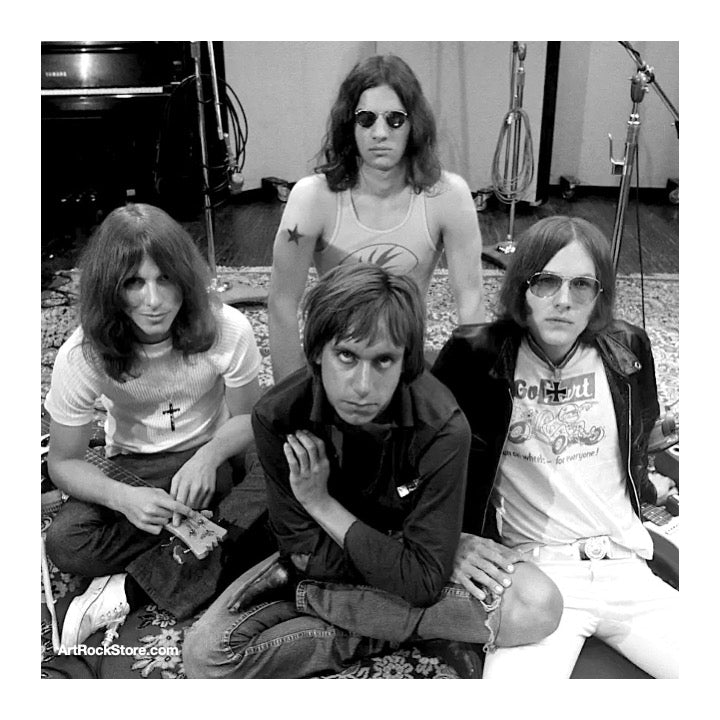
The Stooges | Artist
Founding member Dave Alexander died in 2009 at the age of 27, tragically joining that illustrious group of brilliant yet ill-fated artists known as the "27 Club"
The Stooges were an American rock band formed 1967 in Ann Arbor, Michigan, by singer Iggy Pop, guitarist Ron Asheton, drummer Scott Asheton, and bassist Dave Alexander. James Newell Osterberg aka Iggy Pop had played drums in several Ann Arbor-area bands as a teenager, including the Iguanas and the Prime Movers. Iggy was inspired to create a new form of blues music that was not derivative of historical precedents, plus he was influenced by the anarchic proto-punk sound of fellow Michigan band MC5. Iggy found the Asheton brothers, and Dave Alexander to complete the initial lineup, with Iggy as main singer and charismatic frontman and their first gig was at their communal State Street house on Halloween night 1967. During this early period, they were originally billed as the "Psychedelic Stooges" at the Grande Ballroom in Detroit and other venues, where they played with MC5 and others. The band soon gained a reputation for their wild, primitive live performances. Pop became known for his outrageous onstage behaviour—smearing his bare chest with hamburger meat and peanut butter, cutting himself with shards of glass, and flashing his genitalia to the audience. Pop is sometimes credited with the invention or popularization of stage diving. In 1968 Elektra Records signed them and released their self-title debut album the same year, produced by John Cale who had just left the Velvet Underground. Sales were low and it was not well received by critics at the time. In 1970, their second album, Fun House, was released, featuring the addition of saxophonist Steve Mackay. Fun House was also poorly received by critics and the general public. Alexander was dismissed in August 1970 for turning up at gigs too drunk to play, and was replaced by a succession of new bass players. Around this time, the band expanded their line-up by adding a second guitar player, initially roadie Bill Cheatham, and then James Williamson, a childhood friend of the Ashetons and Alexander. By this time the band, with the exception of Ron Asheton, had all become serious heroin users. Their performances became unpredictable, and Pop often had trouble standing up on stage due to his extreme drug abuse. Elektra soon fired the Stooges and the band had a hiatus for several months. With the band in limbo, Pop met David Bowie on 7 September 1971 at Max's Kansas City and the pair became good friends. On the advice of Bowie, Pop signed a recording contract with manager Tony DeFries' company, MainMan. Soon after, DeFries introduced Pop to Clive Davis from Columbia Records and got a two-album recording deal. In March 1972, DeFries brought Pop and Williamson to the UK, and the pair attempted to re-form the Stooges with British musicians, but finding no suitable additions, brought the Asheton brothers back in. This line-up, billed as Iggy and the Stooges, recorded their third album, the Bowie produced Raw Power, which was released in 1973. At the time, the album faced the criticism that Bowie had mixed it poorly and in 1997, the album was re-mixed by Iggy Pop and re-released. Although the album sold poorly and was regarded as a commercial failure at the time of its release, Raw Power would go on to gain recognition from early punk rockers. The Stooges disbanded again in February 1974 as a result of dwindling work opportunities, compounded by Pop's heroin addiction and erratic off-stage behaviour. Iggy of course eventually got his act together and pursued a solo career, but the crowning legacy of The Stooges remains their three superb studio albums: The Stooges (1969), Fun House (1970) and Raw Power (1973), which are undisputed classics.
Artist Website: iggyandthestoogesmusic.com
Featured Albums: The Stooges
Related Artists: Iggy and The Stooges, Iggy Pop, Iggy Pop & James Williamson, John Cale, David Bowie, Destroy all Monsters
Collections: 27 Forever
